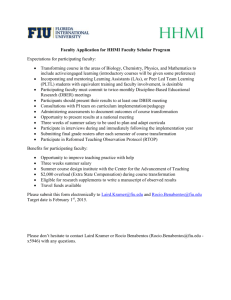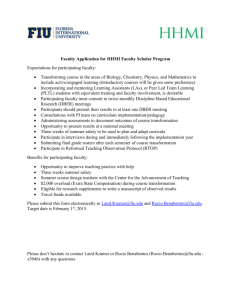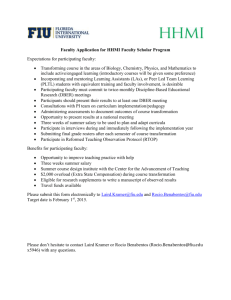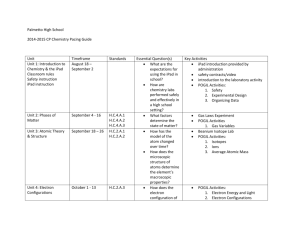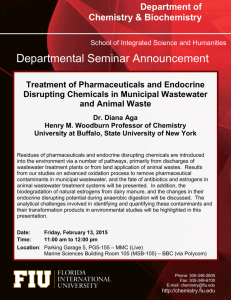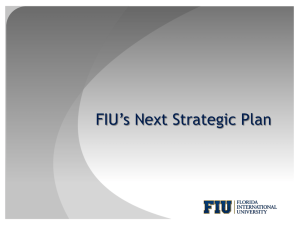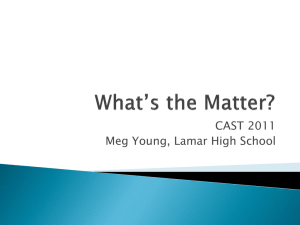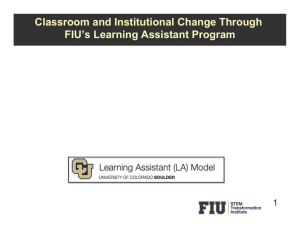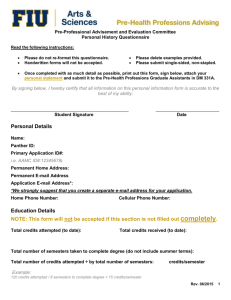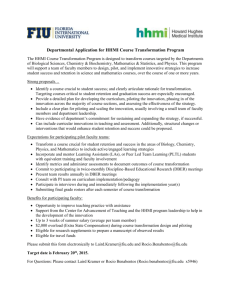sample_POGIL_2015
advertisement
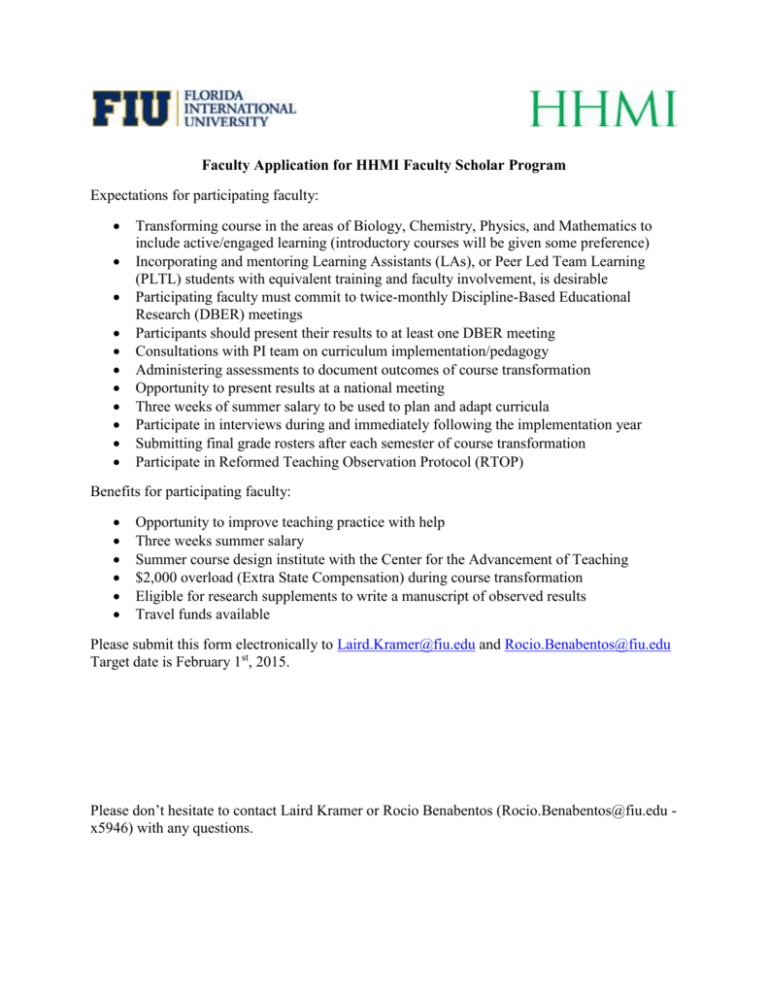
Faculty Application for HHMI Faculty Scholar Program Expectations for participating faculty: Transforming course in the areas of Biology, Chemistry, Physics, and Mathematics to include active/engaged learning (introductory courses will be given some preference) Incorporating and mentoring Learning Assistants (LAs), or Peer Led Team Learning (PLTL) students with equivalent training and faculty involvement, is desirable Participating faculty must commit to twice-monthly Discipline-Based Educational Research (DBER) meetings Participants should present their results to at least one DBER meeting Consultations with PI team on curriculum implementation/pedagogy Administering assessments to document outcomes of course transformation Opportunity to present results at a national meeting Three weeks of summer salary to be used to plan and adapt curricula Participate in interviews during and immediately following the implementation year Submitting final grade rosters after each semester of course transformation Participate in Reformed Teaching Observation Protocol (RTOP) Benefits for participating faculty: Opportunity to improve teaching practice with help Three weeks summer salary Summer course design institute with the Center for the Advancement of Teaching $2,000 overload (Extra State Compensation) during course transformation Eligible for research supplements to write a manuscript of observed results Travel funds available Please submit this form electronically to Laird.Kramer@fiu.edu and Rocio.Benabentos@fiu.edu Target date is February 1st, 2015. Please don’t hesitate to contact Laird Kramer or Rocio Benabentos (Rocio.Benabentos@fiu.edu x5946) with any questions. Howard Hughes Medical Institute – FIU Faculty Scholar Application Name: ___Dr. Marie Curie____________________________________________ Email: ___mcurie@fiu.edu____________________________________________ Title: _____Professor__________________________________________ Course you are proposing to transform (ex PHY 2049): __CHM 1045______________________ Expected Enrollment: _200+_________________ Primary student population in course Upper Division Majors: Lower Division Majors: Non-Science Majors: Service Course: ______________________ __X___________________ ______________________ __X___________________ How frequently have you taught this course in the last 3 years? _Every semester________ After you participate in the Faculty Scholar program, do you anticipate continuing to teach this course? Yes, this is my regular assignment. Please describe your motivation for transforming this course: General Chemistry I serves hundreds of students every year, in lecture halls that are filled to capacity. The course covers a wide array of topics, and draws students from across the science disciplines. Because of the large number of required topics that must be covered, the material is quite dense, and many students struggle with it. But it is easy to look up in the middle of any lecture, no matter how well written, and see many students tuned out. From DBER meetings and from conversations with other faculty, I know that it is possible to introduce substantial amounts of active learning even in large classes. My students can read the textbook at home; I want to give them the benefits of peer and instructor interaction that in-class time provides. Please describe what you anticipate the course will look like after your participation in FS program: Part of every class period will be used for small-group activities, facilitated by Learning Assistants. Some of the material I have to cover will be shifted from lecture to at-home reading assignments, and that class time will be used for active learning that focuses on the most important topics for each chapter. LAs will be essential to this transformation, interacting with groups of students around the room and facilitating them when they become stuck. I will also monitor the progress of the class as a whole using clicker questions after activities. Have you identified any curricula for potential adoption? (This is non-binding) If so, why have you identified this curriculum? I intend to use the POGIL (Process-Oriented Guided Inquiry Learning) materials for the transformed class. POGIL activities use a learning cycle structure to help small teams of students work through difficult topics by exploring, defining, and applying topics. Each set of worksheets builds up from simple and straightforward questions, to developing a "model," then ends in more open-ended questions requiring extension of that model. The POGIL project began in chemistry, and there are a large supply of activities available at all levels, including plenty for the introductory course. The POGIL project has also published a white paper specifically about the challenges of using the activities in large classes, and how to overcome them. Are you aware of any assessments that could be used to allow us to gauge student learning in the class you will be transforming? (This may include national normed conceptual tests, common exams from national organizations, etc) I am considering several possible assessments to check the effectiveness of my changes in the course. I will be able to compare the results of common final exams with other chemistry instructors, as well as to previous years of my own class. I am also interested in learning about changes in student attitudes, since helping students to gain a deeper appreciation for chemistry is one of my goals as an instructor. For this, the Colorado Learning Attitudes about Science Survey (CLASS) for chemistry would be helpful, and/or the Student Assessment of Learning Gains (SALG) web survey. Do you anticipate using LAs in this course? If so, what will the role of the LAs be? Learning Assistants are absolutely essential to using active learning in a course this size. During every class period they will circulate between student teams to ask questions, to help students if they have difficulty with an activity, and also to monitor how the class is doing. At weekly prep meetings, they will give me their feedback from this "on the ground" view of students, and we will discuss the upcoming week of activities. Do you anticipate using PLTL in this course? If so, how will you? I will be using LAs instead of PLTL in this course. Do you have anything further you would like us to consider in your application? I understand that travel funds are available as part of the faculty scholar award. I am interested in using mine to travel to a POGIL regional workshop during the summer, to receive more indepth training in how to use this curriculum effectively.
